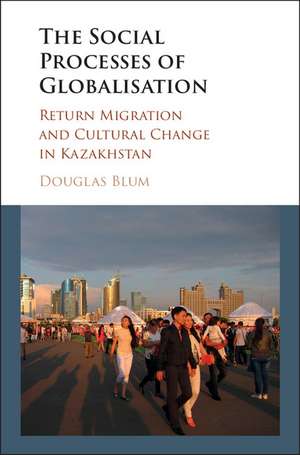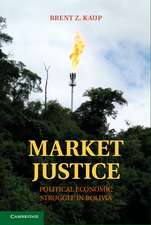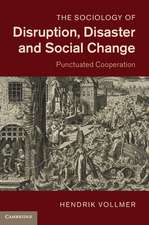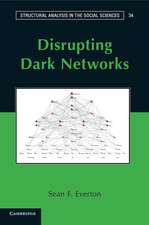The Social Process of Globalization: Return Migration and Cultural Change in Kazakhstan
Autor Douglas W. Blumen Limba Engleză Hardback – 2 dec 2015
Preț: 680.51 lei
Preț vechi: 764.61 lei
-11% Nou
Puncte Express: 1021
Preț estimativ în valută:
130.28€ • 135.42$ • 108.01£
130.28€ • 135.42$ • 108.01£
Carte tipărită la comandă
Livrare economică 07-21 februarie 25
Preluare comenzi: 021 569.72.76
Specificații
ISBN-13: 9781107129689
ISBN-10: 1107129680
Pagini: 224
Ilustrații: 1 b/w illus.
Dimensiuni: 160 x 235 x 18 mm
Greutate: 0.47 kg
Editura: Cambridge University Press
Colecția Cambridge University Press
Locul publicării:New York, United States
ISBN-10: 1107129680
Pagini: 224
Ilustrații: 1 b/w illus.
Dimensiuni: 160 x 235 x 18 mm
Greutate: 0.47 kg
Editura: Cambridge University Press
Colecția Cambridge University Press
Locul publicării:New York, United States
Cuprins
1. Moving beyond hybridity; 2. Kazakhstan: the local context of globalization; 3. Theory: explaining cultural stability and change; 4. Return migrants and the negotiation of cultural difference; 5. Patterns of social and cultural change; 6. Conclusions: globalization, reflexivity and return migration.
Recenzii
'Blum's book is a contribution to our understanding of the globalization of culture and specifically the way that young people who have spent time in the US adapt to life and interpret their own experiences and identities once they have returned to their home country. Blum recognizes that this process is not just the result of structural forces, but also depends on the tools and preferences of individuals who engage in an ongoing process of reflection and negotiation both abroad and at home. The analysis is both theoretically sophisticated and empirically rich, with observations that easily translate beyond the particular cultural context of Kazakhstan.' Laura L. Adams, Former Director, Program on Central Asia and the Caucasus, Harvard University, Massachusetts
'A lively excursion into the everyday worlds of fresh global propositions.' Bruce Grant, New York University
'Whereas it has become a truism that cultural globalization is happening, there has been precious little investigation of what the mechanism of cultural globalization looks like on the ground. In this theoretically rich and insightful study of Kazakh students and young professionals who travel to the US for a few months and then return home, Blum uses captivating empirical data to show that cultural change is a social process that takes place in concrete interpersonal interactions and is governed by the agency and mindset of those who travel between worlds.' Valerie Sperling, Clark University, Massachusetts
'Reading this book will captivate everyone interested in this field of research, especially those examining the cultural changes that have occurred in post-Soviet societies. … This book provides a fascinating starting point … particularly as it constitutes a truly scientific study characterised by objectivity and neutrality as opposed to the pathos of official reports or sceptical articles about the waste of public funds on expensive training that are frequently published in Kazakhstan.' Gulnar Nadirova and Anar Mustafayeva, Europe-Asia Studies
'The book stands out as a result of its combined theoretical and empirical rigor. It is surprising to find such a detailed theoretical account that then builds upon existing approaches by identifying and resolving their nuanced differences. Moreover, the empirical work is excellent, with the author conducting ninety-two semi-structured interviews between 2011 and 2012. The author chose primarily students and interns because they were the most likely to be agents of cultural change (and as the author correctly points out his research seeks to study cultural transformation rather than cultural reproduction).' John Glenn, Slavic Review
'A lively excursion into the everyday worlds of fresh global propositions.' Bruce Grant, New York University
'Whereas it has become a truism that cultural globalization is happening, there has been precious little investigation of what the mechanism of cultural globalization looks like on the ground. In this theoretically rich and insightful study of Kazakh students and young professionals who travel to the US for a few months and then return home, Blum uses captivating empirical data to show that cultural change is a social process that takes place in concrete interpersonal interactions and is governed by the agency and mindset of those who travel between worlds.' Valerie Sperling, Clark University, Massachusetts
'Reading this book will captivate everyone interested in this field of research, especially those examining the cultural changes that have occurred in post-Soviet societies. … This book provides a fascinating starting point … particularly as it constitutes a truly scientific study characterised by objectivity and neutrality as opposed to the pathos of official reports or sceptical articles about the waste of public funds on expensive training that are frequently published in Kazakhstan.' Gulnar Nadirova and Anar Mustafayeva, Europe-Asia Studies
'The book stands out as a result of its combined theoretical and empirical rigor. It is surprising to find such a detailed theoretical account that then builds upon existing approaches by identifying and resolving their nuanced differences. Moreover, the empirical work is excellent, with the author conducting ninety-two semi-structured interviews between 2011 and 2012. The author chose primarily students and interns because they were the most likely to be agents of cultural change (and as the author correctly points out his research seeks to study cultural transformation rather than cultural reproduction).' John Glenn, Slavic Review
Notă biografică
Descriere
A rich and compelling analysis of how cultural globalization occurs, including the structural conditions, personal meanings and social interactions involved.














